#devops engineer training
Explore tagged Tumblr posts
Text
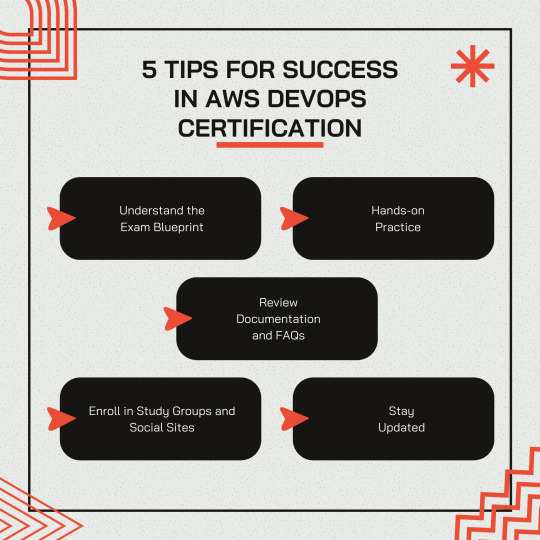
Unlock the power of DevOps in the cloud with our comprehensive AWS DevOps Engineer Certification training course. Designed for professionals seeking to validate their expertise in DevOps practices on the Amazon Web Services (AWS) platform, this course provides a structured learning pathway to help you excel in your career.
0 notes
Text
What is immutable infrastructure in DevOps?
Immutable infrastructure in DevOps refers to an architectural and operational approach where infrastructure components, such as servers, virtual machines, or containers, are created, configured, and deployed in a way that prevents any changes or modifications once they are instantiated. In this paradigm, instead of making direct modifications to existing infrastructure, any desired changes are implemented by creating new instances of infrastructure components with the updated configurations. These new instances are then replaced or added to the environment, while the old instances are decommissioned.
The concept of immutable infrastructure aligns with the principles of automation, consistency, and reproducibility in DevOps practices. By treating infrastructure as code and provisioning it through automated processes, organizations can achieve several benefits. Firstly, the risk of configuration drift and unexpected changes is minimized, as all changes are applied only through the deployment of new instances. This enhances the stability and predictability of the infrastructure environment.
Secondly, immutable infrastructure enables easier rollbacks in case of issues. If a new instance experiences problems, it can be quickly replaced with the previous version, ensuring fast recovery and reducing downtime. This also supports resilience and high availability by allowing the environment to quickly adapt to failures without manual intervention.
Furthermore, immutable infrastructure encourages the use of version control for infrastructure configurations. Infrastructure as Code (IaC) tools like Terraform or Ansible enable teams to define infrastructure configurations in code, enabling versioning, collaboration, and documentation of changes. This promotes consistent practices, transparency, and collaboration among development and operations teams.
Implementing immutable infrastructure requires a shift in how infrastructure is managed. Configuration management tools automate the process of creating and deploying new instances, while continuous integration and continuous deployment (CI/CD) pipelines automate the deployment of applications on top of these instances. This approach aligns well with the DevOps philosophy of automating manual processes and minimizing manual interventions. Apart from it by obtaining DevOps Engineer Course, you can advance your career in DevOps. With this course, you can demonstrate your expertise in Puppet, Nagios, Chef, Docker, and Git Jenkins. It includes training on Linux, Python, Docker, AWS DevOps, many more.
However, adopting immutable infrastructure also presents challenges. Ensuring data persistence, managing stateful applications, and handling updates that require data migration can be complex. Organizations need to carefully design their architecture, implement strategies for data management, and consider compatibility with existing systems.
In summary, immutable infrastructure in DevOps emphasizes creating and managing infrastructure components in a way that prevents modifications once they are instantiated. This approach enhances stability, predictability, and automation, aligning with DevOps principles of automation, consistency, and reproducibility. By treating infrastructure as code and leveraging automation tools, organizations can achieve greater operational efficiency, reduced downtime, and improved resilience in their IT environments.
0 notes
Text
Key DevOps Interview Questions for Developers and Engineers in 2025
As the technology landscape continues to evolve rapidly, the role of DevOps in software development and IT operations has become more crucial than ever. In 2025, organizations will rely heavily on DevOps practices to speed up delivery, improve collaboration, and ensure reliable software deployment. Suppose you’re a developer or engineer preparing for a DevOps interview. In that case, it’s essential to be ready for questions that not only test your technical knowledge but also assess your understanding of modern DevOps culture and practices.
Here’s a guide to some of the key DevOps interview questions you might face in 2025, along with insights into what interviewers are looking for in your answers. Read More

#devops training certification#devops training#devops certificatrion#devops course#network kings#nwkings#it professionals#developers and engineers
0 notes
Text
Hands-On DevOps Projects: Master Jenkins, Docker, AWS & More
Take your DevOps skills to the next level with real-world projects covering essential tools like Jenkins, Terraform, Docker, Kubernetes, AWS services (EC2, VPC, EKS, Route53, and more). Explore practical deployments like three-tier web applications, e-commerce platforms, WordPress sites, and CI/CD automation using Jenkins and Terraform. Dive deep into cloud services, monitoring with Grafana, and advanced deployment strategies in AWS and EKS. Perfect for DevOps enthusiasts looking to gain hands-on experience in a variety of technologies.
#Real-world projects#de solutions#devops training provider#devops and cloud engineer program#devops interview preparation
1 note
·
View note
Text
#azure data engineer#azure course#azure training#azure online training#azure certification#microsoft azure certification#azure certification path#azure fundamentals#azure devops certification#azure cloud certification#microsoft azure fundamentals
1 note
·
View note
Text
Jira Change and Incident Management Implementation Services
Organizations must operate efficiently and stay agile to remain competitive in today's fast-paced business environment. Managing tasks, projects, and teams can be challenging, especially as businesses scale.
PDF: https://www.slideshare.net/slideshow/jira-administrator-projects-in-philadelphia-pdf/272650805
#best jira training#azure devops training#agile maturity assessment#jira assessment#site reliability engineering training#jira administrator projects
0 notes
Text
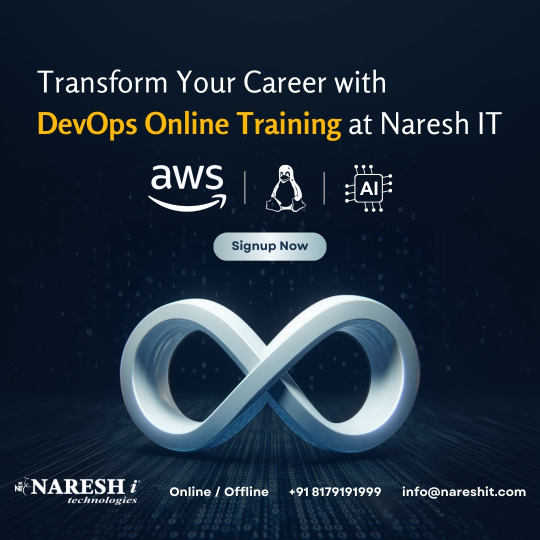
Boost your career with hands-on DevOps Online Training. Learn from industry experts and gain practical skills to become a DevOps pro. Enroll in our DevOps Online Training to get certified and accelerate your career!
#devops#DevOpsOnlineTraining#LearnDevOps#devops certification#DevOps Courses#DevOps Career#online training#devops engineer#devops tools#devops automation#DevOps Cloud#DevOps Best Practices#DevOps Hands-on Training#DevOps for Beginners
0 notes
Text
Master DevOps: Your Complete Guide and Roadmap | DevOps Online Training

Introduction to DevOps
In today's rapidly evolving technological landscape, the need for streamlined and efficient software development practices has never been greater. Enter DevOps—a culture, philosophy, and set of practices that bring development (Dev) and operations (Ops) together to improve collaboration, integration, and automation throughout the software development lifecycle. DevOps is not just a buzzword; it's a transformative approach that enables organizations to deliver high-quality software faster and more reliably. If you're looking to build a career in this field, DevOps Online Training is your gateway to mastering the skills required to excel in this domain.
What is DevOps?
DevOps is a combination of practices, tools, and cultural philosophies designed to increase an organization's ability to deliver applications and services at high velocity. By breaking down the traditional silos between development and operations teams, DevOps fosters a culture of collaboration, where both teams work together throughout the entire software development lifecycle. This collaboration leads to faster development, more frequent deployment of updates, and higher overall software quality.
At its core, DevOps emphasizes automation, continuous integration, continuous delivery (CI/CD), and monitoring. The goal is to minimize manual intervention, reduce errors, and improve the efficiency of software development and deployment. Through DevOps Online Training, you can learn how to implement these practices in real-world scenarios, making you an invaluable asset to any tech organization.
How DevOps Works
DevOps is built on a set of principles and practices that enable organizations to build, test, and deploy software rapidly and efficiently. Here's how DevOps works in practice:
1. Continuous Integration and Continuous Deployment (CI/CD)
Continuous Integration (CI) is the practice of merging code changes frequently, often multiple times a day, into a shared repository. Automated testing is then conducted to identify and resolve issues early in the development process. Continuous Deployment (CD) takes this a step further by automatically deploying code changes to production after passing the CI pipeline. Together, CI/CD reduces the time between writing code and delivering it to customers, ensuring that software updates are released frequently and reliably.
2. Automation
Automation is a critical component of DevOps. From building and testing code to deploying and monitoring applications, automation helps streamline the entire software development lifecycle. By automating repetitive tasks, teams can focus on more strategic activities, such as optimizing code and improving system performance. Automation tools like Jenkins, Ansible, and Puppet are commonly used in DevOps to create efficient, repeatable processes.
3. Infrastructure as Code (IaC)
Infrastructure as Code (IaC) is the practice of managing and provisioning computing infrastructure through machine-readable scripts rather than manual processes. This approach allows teams to automate the setup and configuration of environments, ensuring consistency across development, testing, and production stages. Tools like Terraform and AWS CloudFormation are popular choices for implementing IaC.
4. Monitoring and Logging
Effective monitoring and logging are essential to maintaining the health and performance of applications in a DevOps environment. By continuously monitoring systems and capturing logs, teams can identify and resolve issues before they impact end-users. Tools like Prometheus, Grafana, and ELK Stack are widely used for monitoring and logging in DevOps.
5. Collaboration and Communication
DevOps is as much about culture as it is about technology. A key aspect of DevOps is fostering a culture of collaboration and communication between development, operations, and other stakeholders. This collaboration ensures that everyone is aligned with the project's goals and that issues are addressed quickly. Tools like Slack, Microsoft Teams, and Jira facilitate communication and collaboration in a DevOps environment.
6. Security in DevOps (DevSecOps)
As security becomes increasingly important in software development, DevOps practices have evolved to include security as a core component. DevSecOps integrates security into every stage of the software development lifecycle, ensuring that security vulnerabilities are identified and addressed early in the process. By adopting DevSecOps practices, organizations can build more secure applications without compromising on speed and agility.
The Roadmap to Becoming a DevOps Engineer
Becoming a DevOps engineer requires a combination of technical skills, practical experience, and a deep understanding of DevOps principles. Here's a step-by-step roadmap to guide you on your journey:
1. Understand the Basics of DevOps
Before diving into specific tools and technologies, it's important to understand the fundamental principles of DevOps. Learn about the core concepts of CI/CD, automation, IaC, and monitoring. DevOps Online Training can provide you with a solid foundation in these areas, helping you grasp the essential elements of DevOps.
2. Gain Proficiency in Programming and Scripting
A strong foundation in programming and scripting is essential for a DevOps engineer. Start by learning a programming language like Python, Ruby, or Go, as well as scripting languages like Bash or PowerShell. These skills will enable you to automate tasks, write custom scripts, and work with various DevOps tools.
3. Master Version Control Systems
Version control systems (VCS) like Git are critical to DevOps practices. Learn how to use Git for version control, branching, and merging code. Understand how to collaborate with other developers using GitHub, GitLab, or Bitbucket. Version control is a fundamental skill that every DevOps engineer must possess.
4. Get Hands-On with CI/CD Tools
CI/CD is at the heart of DevOps, so gaining hands-on experience with CI/CD tools is crucial. Learn how to set up and configure Jenkins, CircleCI, or Travis CI to automate the build, test, and deployment processes. DevOps Online Training often includes practical labs and exercises that allow you to practice using these tools in real-world scenarios.
5. Learn About Infrastructure as Code (IaC)
IaC is a key practice in DevOps, enabling teams to manage and provision infrastructure programmatically. Familiarize yourself with IaC tools like Terraform, AWS CloudFormation, and Ansible. Learn how to write scripts that automate the creation and configuration of infrastructure, ensuring consistency across environments.
6. Develop Cloud Computing Skills
Cloud computing is an integral part of DevOps, as it provides the scalability and flexibility needed for modern software development. Gain proficiency in cloud platforms like AWS, Azure, or Google Cloud. Learn how to deploy applications to the cloud, manage cloud resources, and work with cloud-based DevOps tools.
7. Enhance Your Automation Skills
Automation is a cornerstone of DevOps, so it's essential to master automation tools and techniques. Learn how to automate tasks using tools like Jenkins, Puppet, and Chef. Understand how to create automated workflows that integrate with other DevOps tools and processes.
8. Learn About Monitoring and Logging
Effective monitoring and logging are crucial for maintaining the health of applications in a DevOps environment. Familiarize yourself with monitoring tools like Prometheus and Grafana, as well as logging tools like the ELK Stack. Learn how to set up monitoring dashboards, create alerts, and analyze logs to identify and resolve issues.
9. Embrace DevSecOps Practices
Security is a critical aspect of DevOps, and understanding DevSecOps practices is essential for a successful career in this field. Learn how to integrate security into the CI/CD pipeline, conduct security testing, and implement security best practices throughout the software development lifecycle.
10. Gain Practical Experience
Theory alone is not enough to become a proficient DevOps engineer. Hands-on experience is crucial. Work on real-world projects, contribute to open-source DevOps projects, or participate in internships. Practical experience will help you apply the skills you've learned and build a portfolio that showcases your expertise.
11. Obtain DevOps Certifications
Certifications can validate your skills and make you stand out in the job market. Consider obtaining certifications like AWS Certified DevOps Engineer, Google Cloud DevOps Engineer, or Microsoft Certified: Azure DevOps Engineer Expert. These certifications demonstrate your proficiency in DevOps practices and tools.
12. Stay Updated with Industry Trends
The field of DevOps is constantly evolving, with new tools and practices emerging regularly. Stay updated with industry trends by reading blogs, attending conferences, and participating in online communities. DevOps Online Training programs often include updates on the latest trends and tools in the industry.
13. Build a Strong Professional Network
Networking is important in any career, and DevOps is no exception. Join DevOps communities, attend meetups, and connect with other professionals in the field. Building a strong network can lead to job opportunities, collaborations, and valuable insights.
14. Prepare for DevOps Interviews
As you near the end of your learning journey, it's time to prepare for DevOps interviews. Practice common DevOps interview questions, participate in mock interviews, and review your projects and experiences. DevOps Online Training programs often include interview preparation sessions to help you succeed in landing your first DevOps job.
Conclusion
DevOps is a powerful approach that has revolutionized the way software is developed, tested, and deployed. By fostering collaboration between development and operations teams and leveraging automation, CI/CD, and cloud computing, DevOps enables organizations to deliver high-quality software at a rapid pace. Whether you're just starting your career or looking to transition into the field, DevOps Online Training can provide you with the skills and knowledge needed to succeed as a DevOps engineer.
By following the roadmap outlined in this article, you can develop the technical expertise, practical experience, and industry knowledge required to excel in DevOps. Remember to stay updated with the latest trends, build a strong network, and continuously improve your skills.
#devops#devopsonlinetraining#devops engineer#DevOps Roadmap#web development#development#software#Continuous Integration#Continuous Deployment#Cloud Computing#Automation#Software Development#IT Training#cicd#it training institute#it training courses#it training classes
0 notes
Text
Docker-Compose is an indispensable tool for managing multi-container Docker applications. With a simple YAML file, you can define, configure, and deploy all the services your application needs.
0 notes
Text
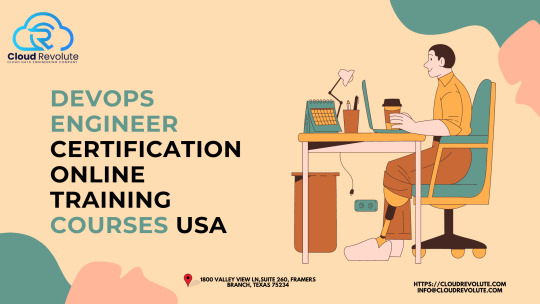
Best Devops Course Online USA-Cloud Revolute
0 notes
Text
AWS DevOps Engineer Certification Training: A Comprehensive Guide to Mastering DevOps
Introduction
In today's fast-paced digital landscape, the integration of development and operations (DevOps) practices has become paramount for organizations striving to achieve agility, efficiency, and reliability in their software development lifecycle. Among the various cloud platforms available, Amazon Web Services (AWS) stands out as a leader in providing robust DevOps solutions. If you're looking to advance your career in DevOps and validate your skills, pursuing an AWS DevOps Engineer certification training course could be your next step towards success.
Understanding AWS DevOps Certification
The AWS DevOps Engineer certification is designed for professionals who possess advanced technical skills and experience in provisioning, operating, and managing distributed application systems on the AWS platform. This certification validates your expertise in implementing DevOps practices and tools in the AWS environment, ensuring seamless integration between development and operations teams.
Why Pursue DevOps Certification?
Career Advancement Opportunities:
Earning an AWS DevOps certification opens doors to a wide range of career opportunities. DevOps engineers are in high demand as organizations increasingly prioritize agility, automation, and collaboration in their software development processes. With this certification, you demonstrate your proficiency in leveraging AWS services to streamline development workflows, optimize infrastructure, and enhance deployment practices, making you a valuable asset to any organization.
Mastery of DevOps Tools and Practices:
The AWS DevOps Engineer certification training equips you with in-depth knowledge of various DevOps tools and practices essential for modern software development. From continuous integration and continuous deployment (CI/CD) pipelines to infrastructure as code (IaC) and monitoring solutions, you'll gain hands-on experience with industry-leading tools like AWS CodePipeline, AWS CodeDeploy, AWS CloudFormation, and AWS CloudWatch. By mastering these tools, you'll be well-prepared to architect scalable, reliable, and automated DevOps solutions on AWS.
Validation of Skills:
Certification serves as tangible proof of your expertise and commitment to excellence in DevOps. By passing the rigorous AWS DevOps Engineer exam, you demonstrate your proficiency in designing, implementing, and managing DevOps practices on AWS. This validation not only boosts your confidence but also enhances your credibility in the eyes of employers, clients, and peers, opening up new avenues for career growth and advancement.
Overview of AWS DevOps Engineer Certification Training Course
Core Concepts Covered:
The AWS DevOps Engineer certification training course encompasses a comprehensive curriculum designed to cover the core concepts and skills required for success in DevOps roles. Key topics include:
AWS services for DevOps: Explore a wide range of AWS services, including compute, storage, networking, databases, and monitoring, and learn how to leverage them to build resilient and scalable DevOps solutions.
Continuous Integration and Continuous Deployment (CI/CD): Understand the principles of CI/CD and learn how to implement automated build, test, and deployment pipelines using AWS CodePipeline, AWS CodeBuild, and AWS CodeDeploy.
Infrastructure as Code (IaC): Discover the benefits of managing infrastructure as code and master tools like AWS CloudFormation to provision and manage AWS resources using declarative templates.
Monitoring and Logging: Learn how to monitor the health and performance of your AWS infrastructure and applications using AWS CloudWatch, AWS X-Ray, and other monitoring tools.
Security and Compliance: Explore best practices for securing your AWS environment and ensuring compliance with industry standards and regulations, including IAM policies, encryption, and auditing.
Hands-on Labs and Projects:
The certification training course includes hands-on labs, exercises, and real-world projects designed to reinforce your learning and practical skills. Through guided exercises and projects, you'll have the opportunity to apply theoretical concepts to real-world scenarios, gaining valuable experience in designing, implementing, and troubleshooting DevOps solutions on AWS.
Expert Guidance and Support:
Throughout the training course, you'll receive expert guidance and support from certified AWS instructors with extensive industry experience. Whether you have questions about course material, need assistance with lab exercises, or require clarification on certification exam topics, our instructors are here to help you succeed.
Tips for Success in AWS DevOps Certification
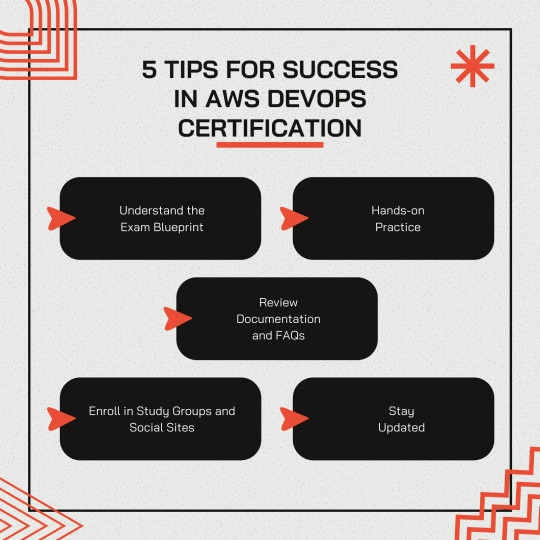
1. Understand the Exam Blueprint:
Familiarize yourself with the AWS DevOps Engineer certification exam blueprint, which outlines the topics and skills covered in the exam. Focus your study efforts on mastering these key areas to ensure you're well-prepared for the exam.
2. Hands-on Practice:
Practice, practice, practice! Hands-on experience is essential for success in DevOps roles and certification exams. Take advantage of the lab exercises and projects included in the training course to gain practical experience with AWS services and tools.
3. Review Documentation and FAQs:
AWS offers comprehensive documentation and FAQs for all its services. Make use of these resources to deepen your understanding of AWS services, explore best practices, and clarify any concepts or topics you find challenging.
4. Enroll in Study Groups and Social Sites:
Join discussion boards, study groups, and online communities devoted to obtaining an AWS DevOps certification to become involved with the AWS community. Collaborating with peers, exchanging ideas, and sharing knowledge can all improve your learning process and offer insightful new viewpoints.
5. Stay Updated:
The field of DevOps is constantly evolving, with new tools, practices, and technologies emerging regularly. Stay updated with the latest trends, developments, and updates in the DevOps ecosystem to ensure your skills remain relevant and in-demand.
Conclusion:
The AWS DevOps Engineer certification training course offers a structured pathway for professionals looking to advance their careers in DevOps. By mastering key concepts, tools, and practices on the AWS platform, you'll not only validate your skills but also gain the expertise needed to architect, deploy, and manage scalable and reliable DevOps solutions in the cloud. Whether you're a seasoned DevOps practitioner or a newcomer to the field, investing in AWS DevOps certification can be a transformative step towards achieving your career goals and unlocking new opportunities in the dynamic world of cloud computing.
0 notes
Text
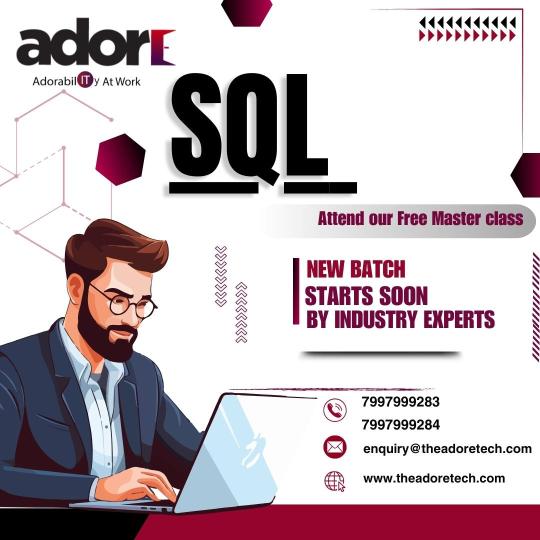
Adore Technologies,
"Unlock the power of data with our comprehensive SQL course! Join us on a journey to master Structured Query Language and delve into the world of efficient database management and analysis. Let's transform your career prospects together! #SQLMastery #DataDrivenFuture"
#digital illustration#devops#deep learning#data science#cybersecurity#power bi#ielts#gcp data engineer training in ameerpet#digital marketing#machinelearning#sqlserver#sql course#sqlexperts#educación#bachelors degree
1 note
·
View note
Text

Python courses in Aurangabad: Join for Python courses in Aurangabad offered by AVD Group to advance your coding knowledge and acquire the most recent programming methods. Our skilled instructors give you hands-on instruction using the most recent Python tools and methods to help you become an expert in Python. Our thorough curriculum gives you the knowledge you need to succeed in the industry, covering everything from basic Python ideas to advanced concepts. Join us now and enhance your programming skills with AVD Group's Python courses in Aurangabad.
0 notes
Text
Planning and Executing Jira Instance Upgrades for Improved Features and Security
In Philadelphia’s bustling business environment, efficient project management is crucial for success. As organisations increasingly adopt Jira to handle their project management needs, the role of a proficient Jira administrator becomes indispensable.
Visit Our Medium Page: https://agilebrainsconsulting2.medium.com/planning-and-executing-jira-instance-upgrades-for-improved-features-and-security-f0443f1bfb81
Address - Philadelphia, Pennsylvania PA
#best jira training#azure devops training#agile maturity assessment#site reliability engineering training#jira administrator projects#jira assessment
0 notes
Text
How to Advance Your Career with AWS Certifications
In the fast-paced world of cloud computing, Amazon Web Services (AWS) has established itself as a leader in providing scalable, reliable, and cost-effective cloud solutions. As organizations increasingly migrate their workloads to the cloud, the demand for skilled AWS professionals has surged. If you're looking to advance your career in the IT industry, AWS certifications can be your ticket to success. We'll explore how AWS certifications can propel your career forward and provide a step-by-step guide to achieving them.
The Power of AWS Certifications
AWS certifications are widely recognized in the IT industry and are considered a valuable asset for both newcomers and seasoned professionals. Here are some key reasons why AWS certifications can supercharge your career:
1. Industry Recognition
AWS is a trusted name in cloud computing, and their certifications are well-respected by employers worldwide. Holding an AWS certification demonstrates your expertise and commitment to staying current in a rapidly evolving field.
2. Career Advancement
AWS certifications can open doors to new job opportunities and promotions. Many organizations prefer to hire certified professionals because they are seen as more capable and knowledgeable in AWS technologies.
3. Increased Earning Potential
Certified AWS professionals often command higher salaries than their non-certified counterparts. According to a survey by Global Knowledge, AWS-certified individuals earn an average salary that is significantly above the industry average.
4. Skill Validation
Obtaining an AWS certification validates your skills and knowledge in specific AWS services and technologies. It serves as concrete evidence of your expertise in the eyes of potential employers.
Choosing the Right AWS Certification
AWS offers a wide range of certifications, catering to various roles and skill levels. Before you embark on your certification journey, it's essential to choose the one that aligns with your career goals and current experience. Here are a few popular AWS certifications:
1. AWS Certified Cloud Practitioner
Designed for individuals with little or no cloud experience, this entry-level certification provides a broad overview of AWS services, cloud concepts, and basic architectural best practices.
2. AWS Certified Solutions Architect
This certification is ideal for those interested in designing distributed systems on AWS. It covers topics like architectural best practices, security, and scalability.
3. AWS Certified SysOps Administrator
Focused on system operations and management, this certification is suitable for individuals responsible for deploying, managing, and operating systems on AWS.
4. AWS Certified DevOps Engineer
For those interested in automation, this certification validates skills related to continuous delivery, automation, and managing infrastructure as code.
5. AWS Certified Security - Specialty
For security professionals, this certification focuses on securing AWS workloads and implementing advanced security measures.
Steps to AWS Certification Success
Now that you've decided on the right certification, here are the steps to help you achieve your goal:
1. Set Clear Goals
Define your career goals and how AWS certifications align with them. Having a clear vision will keep you motivated throughout your certification journey.
2. Choose Relevant Training Resources
AWS provides extensive documentation and training resources, including online courses, practice exams, and official study guides. Consider enrolling in AWS Certified training courses, which are designed to help you prepare for the exams.
3. Hands-On Experience
Practice is key to mastering AWS. Create your AWS account and experiment with the services covered in your chosen certification. Hands-on experience will deepen your understanding and boost your confidence.
4. Study and Prepare
Devote time to study and review the certification's objectives. Use study guides, practice exams, and community forums to reinforce your knowledge.
5. Take Practice Exams
Practice exams are invaluable for gauging your readiness. They help you identify areas where you need to improve and build your test-taking skills.
6. Schedule and Take the Exam
Once you feel confident in your knowledge, schedule your exam. AWS offers both online and in-person testing options to accommodate your preferences.
7. Stay Informed
AWS constantly updates its services and certifications. Stay informed about changes and consider pursuing additional certifications to continue growing in your career.
Conclusion
AWS certifications have become a gold standard in the IT industry, and they offer an excellent opportunity to advance your career. Whether you're starting from scratch or looking to level up your skills, there's a certification tailored to your needs. Remember that certification is a journey, not a destination. Keep learning, stay updated, and embrace the dynamic world of AWS to unlock the full potential of your cloud computing career. With dedication and the right certifications, you can be on your way to a brighter and more rewarding future in the world of cloud computing.
#AWS Certifications#AWS Training#Cloud Computing Certifications#Amazon Web Services#AWS Solutions Architect#AWS Certified Developer#AWS Certified SysOps Administrator#AWS Certified Cloud Practitioner#AWS Certified DevOps Engineer#AWS Specialty Certifications#Cloud Security Certifications#Cloud Networking Certifications
0 notes
Text
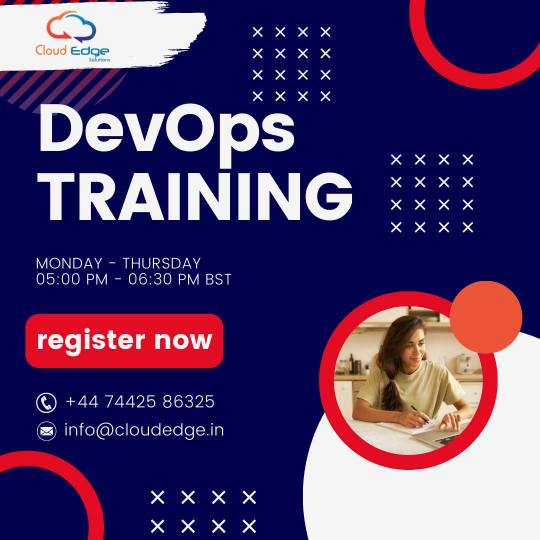
#DevOpsTraining #CloudEdgeSolutions #CareerGrowth #JobAssistance #HandsOnLearning #JoinUsNow #salesforce #crm #marketing #salesforceadmin #salesforcedeveloper #salesforcecertified #salesteam #salesforcetraining #cloud #apex
#devops#salesforce#youtube#software#training#besttraining#developers#code#javascript#sql#software engineering#java development company#crm#crm software#erpsoftware#ecommerce#it services
0 notes